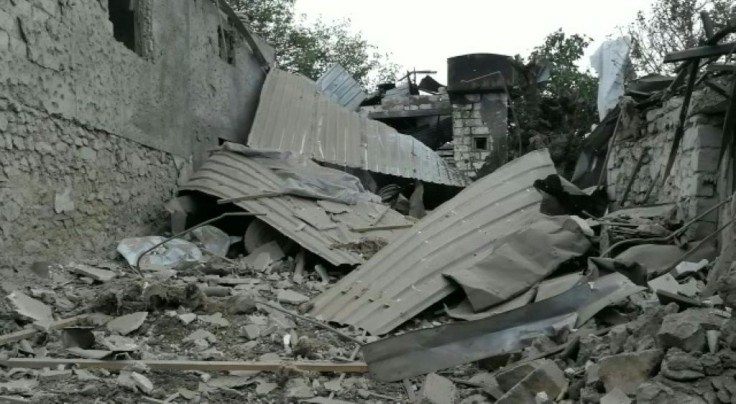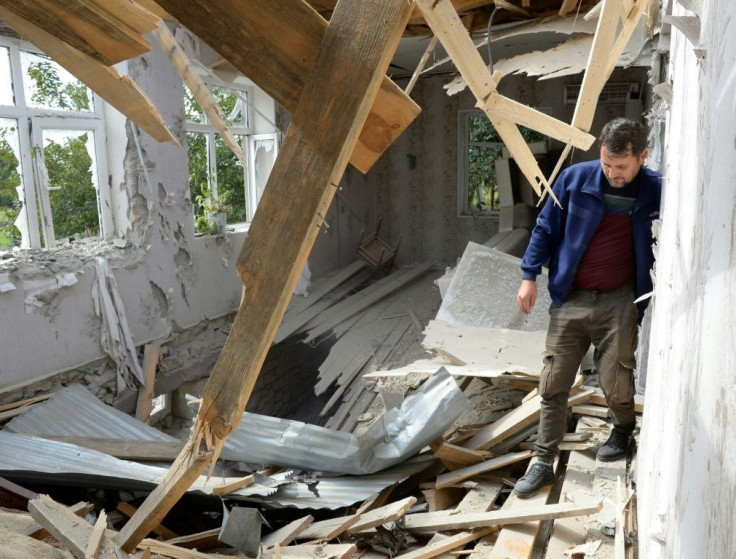Half Karabakh Population Displaced As Putin Says Tragedy Must End
Clashes between Armenian and Azerbaijani forces have displaced half of the population of the breakaway Nagorno-Karabakh region, an official said on Wednesday, as Russian President Vladimir Putin urged an end to a "tragedy" that shows no sign of abating.
The conflict has drawn in regional powers, with French Foreign Minister Jean-Yves Le Drian warning that Turkey's backing of Azerbaijan risks fuelling the "internationalisation" of the conflict.
The fighting in one of the most combustible frozen conflicts resulting from the fall of the Soviet Union erupted on September 27, with Azerbaijan insisting the Armenian-held region must return to Baku's control.
"Of course this is a huge tragedy. People are dying, there are heavy losses on both sides," Putin said during an interview with state-run television.

Even if the longstanding conflict could not be resolved, a ceasefire must be agreed "as quickly as possible", added Putin.
Intermittent shelling by Azerbaijan's forces has turned Karabakh's main city Stepanakert into a ghost town dotted with unexploded munitions and shell craters.
Much of Stepanakert's 50,000-strong population has left, with those remaining hunkering down in cellars.
Air raid sirens and explosions sounded throughout the night in a city plunged into total darkness.

The city was hit by new strikes in the morning, with smoke visible and buzzing indicating the source was a drone, an AFP correspondent said.
"According to our preliminary estimates, some 50 percent of Karabakh's population and 90 percent of women and children -- or some 70,000-75,000 people -- have been displaced," Karabakh rights ombudsman Artak Beglaryan told AFP Wednesday.
Azerbaijan has accused Armenian forces of shelling civilian targets in urban areas, including its second-largest city of Ganja.

Dozens of civilians have been confirmed killed in the fighting and the Armenian side has acknowledged more than 300 military deaths. Azerbaijan has not admitted to any fatalities among its troops.
Azerbaijani prosecutors said 427 dwellings populated by roughly 1,200 people had been destroyed since the start of the current conflict.
But Le Drian, speaking to the French parliament, accused Azerbaijan of initiating the current conflict and lamented "the large number of civilian victims for the sake of meagre progress" on the ground by Azerbaijan.
He said "meetings" would take place on Thursday in Geneva and Monday in Moscow with the hope of starting negotiations, without giving details.
Nagorno-Karabakh broke away from Azerbaijan in a 1990s war that claimed the lives of some 30,000 people. The Armenian separatists declared independence.

Nagorno-Karabakh's 140,000 inhabitants are now almost exclusively Armenians after the remaining Azerbaijanis left in the 1990s war.
However, the international community regards it as part of Azerbaijan and no state, including Armenia itself, recognises its independence.
Sporadic fighting has erupted frequently since a May 1994 ceasefire, most notably in 2016 in an eruption many saw as a brief war.
But analysts say Turkey's involvement this time has changed the landscape.
Turkey has reportedly sent pro-Ankara Syrian fighters to boost Azerbaijan forces and also home-produced drones that have already been deployed with success in Libya and Syria.
"The new aspect is that there is military involvement by Turkey which risks fuelling the internationalisation of the conflict," Le Drian said.
Turkey has sent 1,200 fighters, at least 64 have already died, according to the UK-based Syrian Observatory for Human Rights.
But Turkish Foreign Minister Mevlut Cavusoglu said on Tuesday the world should back Azerbaijan as the "side of those who are right", describing Armenia as the "occupier".
Russia has cordial relations and sells arms to both sides. But it has a military base in Armenia and Yerevan is a member of a Russia-led regional security group while Baku is not.
Pashinyan told AFP he was confident Russia would come to its aid because of the two countries' membership in the Collective Security Treaty Organisation military alliance (CSTO).
But he noted: "The hostilities, which to our great regret, continue to this day, are not taking place on the territory of Armenia."
In an interview with Russian television, Azerbaijan Prime Minister Ilham Aliyev said it was "unacceptable" that Armenia was trying to draw the CSTO into the conflict.
Meanwhile, Kremlin spokesman Dmitry Peskov sounded a note of alarm over the presence of Syrian fighters, saying it posed a "great danger and is a reason for the deep concern of Russia".
Iran's President Hassan Rouhani also said on Wednesday he would not tolerate "terrorists from Syria and other places" near its border with Azerbaijan.
Tehran maintains cordial relations with its Christian neighbour Armenia and distrusts Azerbaijan's military cooperation with Israel.
© Copyright AFP 2024. All rights reserved.




















